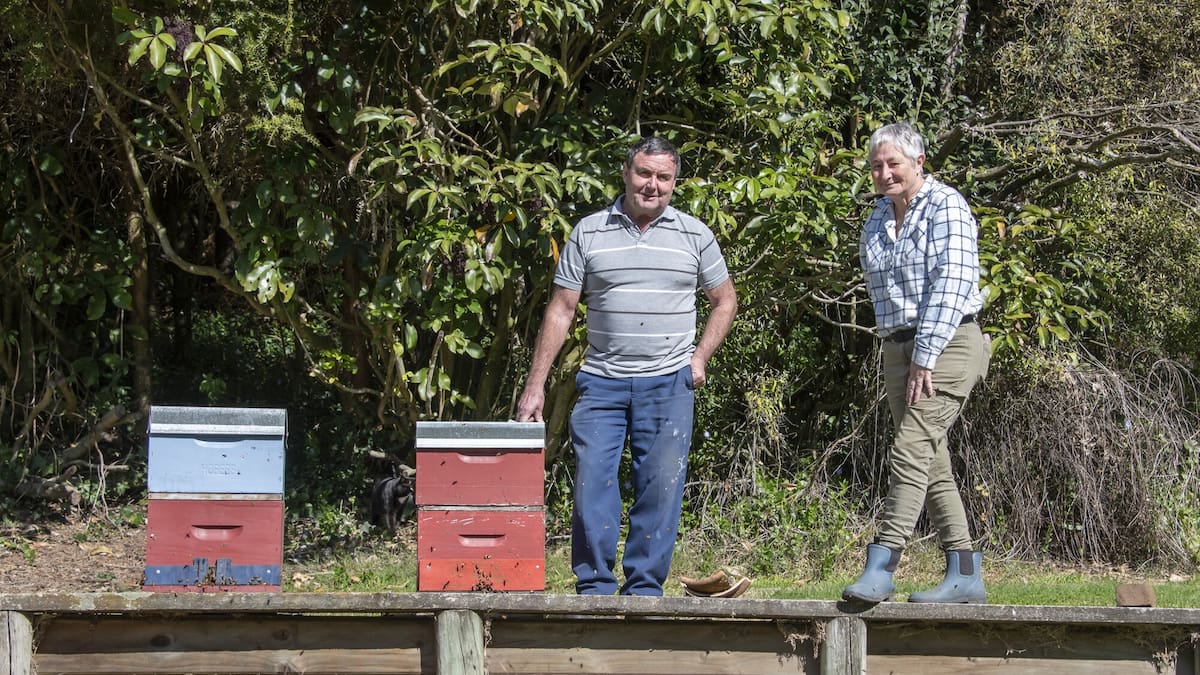“My constable and I were investigating, with the help of her husband, who was a commercial beekeeper.”
Bees of their own
The Milnes let the beekeeper put some hives in their orchard, but Gaylene said they stayed well away from them, cautious of being stung.
When those hives were moved on, Kevin did a deep dive into beekeeping using YouTube and the advice of a beekeeper friend.
“It started with two hives, then four, then six, and we started to sell the honey to cover the costs,” Gaylene said.
By the time they moved to the Waikato, they had six hives on their son’s Otorohanga farm and their own six.
The bees were transported in the cool of the night when they’d all returned home and the hive entrance had been closed.
Bees settle quickly into a new location and find new food sources.
There was a noticeable difference in honey colour after the Waikato move.
“We were used to lighter honey from dairy pasture clover, but in December 2024, our first extraction was much darker,” Gaylene said.
“Our bees were going to urban shrubs and native bush.
“Once the local clover started our honey lightened, as they moved on to that food source.”
Kevin researched beekeeping extensively, and the couple invested in their own honey extraction equipment, housed in a small shed at home.
Other small-scale beekeepers bring their honey to the Milnes for extraction.
Sharing their bees
Kevin and Gaylene Milne enjoy their retirement hobby of beekeeping. Photo / Catherine Fry
“We breed queens for calmness. This trait is essential for safe handling of the hives, and they are less likely to swarm.”
The bees are monitored closely during October/November, which is swarm season.
Kevin will either increase the hive size or split a colony, leaving half with the old queen and introducing the other half to a new queen in a new hive.
The Milnes are often called to deal with a swarm of bees from elsewhere that have settled in someone’s garden or an unsafe place.
“Swarming bees aren’t usually aggressive, and it always amazes people that we can gently scoop them up into a box,” Kevin said.
“They’re just looking for somewhere else to set up a hive.”
The couple sell their honey at local markets and happily engage in conversations with people about beekeeping, honey and hives.
“We also run demonstrations at home where we open up hives and discuss how bees live and work.
“Kids are fascinated and love putting on a bee suit.
“They learn how to behave around bees, so they are less likely to be stung.”
Telling the bees
According to phylogenetic analysis, bees are thought to have originated around 124 million years ago, and as humans evolved, bees’ importance to human survival as plant pollinators was recognised.
Bees are depicted in mythology, art, literature and folklore around the world.
For centuries, various cultures have informed the bees about important events in human life, such as births, deaths and marriages, and that practice of “telling the bees” is still carried out.
Kevin is on his own journey with post-traumatic stress disorder (PTSD), a result of continual exposure to stress and trauma during his career, and finds being outside with his bees very healing.
Almost every evening he talks to his bees, handles them and spends time with the hives.
“I’m not sure why it helps; maybe it’s because you have to be very calm around bees,” he said.
“Gaylene wonders if it’s the harmonic frequencies emitted from the buzzing that has a relaxing effect on the brain.”
It seems people in the US agree, as the country has a Beekeeping For Veterans wellbeing programme.
According to the website www.beekeepingforveterans.com, “Bees help decrease distress and improve mood by increasing the release of endorphins in the person interacting with bees. While beekeeping, one needs to maintain a calm mind, be in the moment and be mindful of their movements.
“Honeybees will quickly and progressively remind someone who has drifted mentally to other thoughts or stressors, starting with a change in the sound of the hive, then bumping the beekeeper and buzzing around their heads prior to attempting to sting.”
Whatever the reason for their effect is, spending hours around his bees is Kevin’s happy place.

